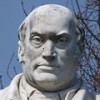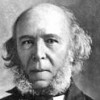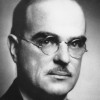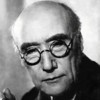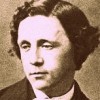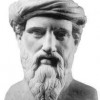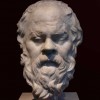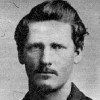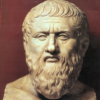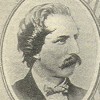Memory is often the attribute of stupidity; it generally belongs to heavy spirits whom it makes even heavier by the baggage it loads them down with.
Ambition makes the same mistake concerning power, that avarice makes concerning wealth; she begins by accumulating power, as a mean to happiness, and she finishes by continuing to accumulate it, as an end.
Charles Caleb "C. C." Colton (1780-1832) English cleric, writer, aphorist
Lacon: Or, Many Things in Few Words, Vol. 1, § 148 (1820)
(Source)
Digression is the soul of wit. Take the philosophic asides away from Dante, Milton or Hamlet’s father’s ghost and what stays is dry bones.
Ray Bradbury (1920-2012) American writer, futurist, fabulist
Fahrenheit 451, “Coda” Afterword (1979 ed.)
(Source)
A play on Shakespeare's words.
You also ask, if I think the world tendency is towards Fascism, why do I support the war. It is a choice of evils — I fancy nearly every war is that. I know enough of British imperialism not to like it, but I would support it against Nazism or Japanese imperialism, as the lesser evil. Similarly I would support the USSR against Germany because I think the USSR cannot altogether escape its past and retains enough of the original ideas of the Revolution to make it a more hopeful phenomenon than Nazi Germany. I think, and have thought ever since the war began, in 1936 or thereabouts, that our cause is the better, but we have to keep on making it the better, which involves constant criticism.
The means by which we live have outdistanced the ends for which we live. Our scientific power has outrun our spiritual power. We have guided missiles and misguided men.
Martin Luther King, Jr. (1929-1968) American clergyman, civil rights leader, social activist, preacher
Strength to Love, ch. 7 “The Man Who Was a Fool,” sec. 3 (1963)
(Source)
If a madman were to come into this room with a stick in his hand, no doubt we should pity the state of his mind; but our primary consideration would be to take care of ourselves. We should knock him down first, and pity him afterwards.
The spirit is willing, but the flesh is weak.
Mankind are apt to be strongly prejudiced in favor of whatever is countenanced by antiquity, enforced by authority, and recommended by custom. The pleasure of acquiescing in the decision of others is by most men so preferred to the toil and hazard of inquiry, and so few are either able or disposed to examine for themselves, that the voice of law will generally be taken for the dictates of justice.
No one is an unjust villain in his own mind. Even — perhaps even especially — those who are the worst of us. Some of the cruelest tyrants in history were motivated by noble ideals, or made choices that they would call “hard but necessary steps” for the good of their nation. We’re all the hero of our own story.
The original writer is not he who refrains from imitating others, but he who can be imitated by none.
[L’écrivain original n’est pas celui qui n’imite personne, mais celui que personne ne peut imiter.]
François-René de Chateaubriand (1768-1848) French writer, politican, diplomat
The Genius of Christianity [Le génie du Christianisme], Part 2, Book 1, ch. 3 (1802)
(Source)
Alternate translations:
- "The original style is not the style which never borrows of any one, but that which no other person is capable of reproducing." [tr. White (1856)]
- "An original writer is not one who imitates nobody, but one whom nobody can imitate."
Art is a jealous mistress, and, if a man have a genius for painting, poetry, music, architecture, or philosophy, he makes a bad husband and an ill provider.
Ralph Waldo Emerson (1803-1882) American essayist, lecturer, poet
“Wealth,” The Conduct of Life, ch. 3 (1860)
(Source)
Undoubtedly the highest function of statesmanship is by degrees to accommodate the conduct of communities to ethical laws, and to subordinate the conflicting self-interests of the day to higher and more permanent concerns.
To blame the poor for subsisting on welfare has no justice unless we are also willing to judge every rich member of society by how productive he or she is. Taken individual by individual, it is likely that there’s more idleness and abuse of government favors among the economically privileged than among the ranks of the disadvantaged.
What the object of senile avarice may be I cannot conceive. For can there be anything more absurd than to seek more journey money, the less there remains of the journey?
[Avaritia vero senilis quid sibi velit, non intellego. Potest enim quicquam esse absurdius quam, quo viae minus restet, eo plus viatici quaerere?]
Marcus Tullius Cicero (106-43 BC) Roman orator, statesman, philosopher
De Senectute [Cato Maior; On Old Age], ch. 18 / sec. 65 (18.65) (44 BC) [tr. Shuckburgh (1900)]
(Source)
(Source (Latin)). Alternate translations:Also I may not consceyue nor understande why avaryce & covetyse ought to be in an olde man for ther is no thyng more unreasonable nor more folyssh then is for to hepe gretter quantite of wordily goodes or of vitailles in the tyme when the man hath lesse wey for to endure & lyve.
[tr. Worcester/Worcester/Scrope (1481)]But as for the avarice and covetousness of old men, I am not acquainted therewith, neither do I know what it meaneth. For what can be more absurd or repugnant to all reason than for a wayfaring man, when his journey is now almost dispatched and brought to an end, and hath but little way to go, to provide and furnish himself with the more victuals, and the shorter that his journey is, the more to seek and purvey for costage?
[tr. Newton (1569)]But as for covetousnesse in age, I know not what it meanes; for there can be no greater absurdity, then when the journey is almost done, to take care to provide much more provision.
[tr. Austin (1648), ch. 19]Of Age's avarice I cannot see
What colour, ground, or reason there should be,
Is it not folly? when the way we ride
Is short, for a long voyage to provide.
[tr. Denham (1669)]As for Covetousness, and an eager Desire to heap up Riches in this World, when we are about to leave it, I must own, I know not what to make of it. For what in Nature can be more absurd, than to b e anxiously intent in making Provisions for our Journey, when we are almost at the End of it?
[tr. Hemming (1716)]As to Covetousness, what it can profit an Old Man I am at a Loss to imagine. For what in Life can be more absurd, than to overstock ourselves with Provision, when we are nigh our Journey's End?
[tr. J. D. (1744)]What covetousness in old men can mean, I must own, I cannot comprehend; for can any thing be more senselessly absurd, than that the nearer we are to our journey's end, we should still lay in the more provision for it.
[tr. Logan (1750)]As to avarice, it is inconceivable for what purpose that passion should find admittance into an old man's breast. For surely nothing can be more irrational and absurd than to increase our provision for the road, the nearer we approach to our journey's end.
[tr. Melmoth (1773)]But, as for avarice in an old man, I cannot understand what it purposes. For can anything be more absurd than to seek the more provisions the less remains of the journey?
[Cornish Bros. ed. (1847)]What avarice in an old man can propose to itself I cannot conceive: for can anything be more absurd than, in proportion as less of our journey remains, to seek a greater supply of provisions?
[tr. Edmonds (1874)]Avarice in old age is foolish; for what can be more absurd than to increase our provisions for the road the nearer we approach to our journey's end.
[Common English translation (e.g. (1873))]As for senile avarice, I do not understand what it means; for can anything be more foolish than, in proportion as there is less of the way to travel, to seek the more provision for it?
[tr. Peabody (1884)]As to greediness, I do not know
What it can mean. Can aught be more absurd
Than that as life draws to a close, we seek
More money to assist our journey's end?
[tr. Allison (1916)]As for avariciousness in the old, what purpose it can serve I do not understand, for can anything be more absurd in the traveler than to increase his luggage as he nears his journey's end?
[tr. Falconer (1923)]As for avarice in an old man, I simply can’t understand it; could anything be more ridiculous than to ask for more and more travel-funds as one’s journey grows closer and closer to its end?
[tr. Copley (1967)]But greed is another thing altogether. I can never understand why elderly men are so attached to their money. What could be more pointless? Toward the end of a journey, one’s travelling expenses ought to be less, rather than more.
[tr. Cobbold (2012)]When it comes to old people’s avidity,
It is altogether beyond my pale
To seek more food when shorter is the trail.
[tr. Bozzi (2015)]
I believe in an America where the rights that I have described are enjoyed by all, regardless of their race or their creed or their national origin — where every citizen is free to think and speak as he pleases and write and worship as he pleases — and where every citizen is free to vote as he pleases, without instructions from anyone, his employer, the union leader or his clergyman.
For it is a mad world and it will get madder if we allow the minorities, be they dwarf or giant, orangutan or dolphin, nuclear-head or water-conversationalist, pro-computerologist or Neo-Luddite, simpleton or sage, to interfere with aesthetics. The real world is the playing ground for each and every group, to make or unmake laws. But the tip of the nose of my book or stories or poems is where their rights end and my territorial imperatives begin, run and rule. If Mormons do not like my plays, let them write their own. If the Irish hate my Dublin stories, let them rent typewriters. If teachers and grammar school editors find my jawbreaker sentences shatter their mushmilk teeth, let them eat stale cake dunked in weak tea of their own ungodly manufacture.
Ray Bradbury (1920-2012) American writer, futurist, fabulist
Fahrenheit 451, “Coda” Afterword (1979 ed.)
(Source)
I have never seen anyone who loves virtue as much as he loves beautiful women.
[吾未見好德、如好色者也。]
Confucius (c. 551- c. 479 BC) Chinese philosopher, sage, politician [孔夫子 (Kǒng Fūzǐ, K'ung Fu-tzu, K'ung Fu Tse), 孔子 (Kǒngzǐ, Chungni), 孔丘 (Kǒng Qiū, K'ung Ch'iu)]
The Analects [論語, 论语, Lúnyǔ], Book 9, verse 18 (9.18) and Book 15, verse 13 (15.13) (6th C. BC – AD 3rd C.) [tr. Huang (1997)]
(Source)
The two analects are the same in Chinese, although the second is prefaced by an expression of despair or exasperation (e.g., "It's hopeless!" or "I should just give up!"). In both instances, it is attributed by Sima Qian to Confucius' irritation while riding behind Duke Ling of Wei and his beautiful wife, Nan Tzu.
Legge and other early translators number these as 9.17 and 15.12, as shown below.
(Source: 9.18, 15.13, Chinese). Alternate translations:I have not seen one who loves virtue as he loves beauty.
[tr. Legge (1861), 9.17, 15.12]I have not yet met with the man who loves Virtue as he loves Beauty
[tr. Jennings (1895), 9.17, 15.12]I do not now see a man who can love moral worth in man as he loves beauty in woman. (9.17)
I do not now see a man who loves moral worth as he loves beauty in women. (15.12)
[tr. Ku Hung-Ming (1898)]I have never yet seen a man whose love of virtue equaled his love of woman. (9.17)
I have never yet seen as man as fond of virtue as of beauty. (15.12)
[tr. Soothill (1910)]I do not see love of looking into the mind and acting on what one sees there to match love of someone having beauty. (9.17)
I have not seen anyone who loves acting from inwit as they love a beautiful person. (15.12)
[tr. Pound (1933)]I have never seen anyone whose desire to build up his moral power was as strong as sexual desire. (9.17)
In vain have I looked for one whose desire to build up his moral power was as strong as sexual desire. (15.12)
[tr. Waley (1938)]I have never yet seen people attracted by virtuous scholars as they are by beautiful women. (Reference)
I haven't yet seen people who love virtue as they love beauty. (Reference)
[tr. Lin Yutang (1938)]I have yet to meet a man as fond of high moral conduct as he is of outward appearances.
[tr. Ware (1950), 9.18, 15.13]I have yet to meet the man who is as fond of virtue as he is of beauty in women.
[tr. Lau (1979), 9.18, 15.13]I have never come across anyone who admires virtue as much as he admires sexual attraction.
[tr. Dawson (1993), 9.18, 15.13]I have never seen anyone who loved virtue as much as sex. (9.18)
I have never seen a man who loved virtue as much as sex. (15.13)
[tr. Leys (1997)]I have not seen one person who likes the virtuousness as likes the beauteousness. (9.18)
I cannot see the person who likes the virtuousness as likes the beauteousness. (15.13)
[tr. Cai/Yu (1998)]I have yet to meet the person who is fonder of excellence (de) than of physical beauty.
[tr. Ames/Rosemont (1998), 9.18, 15.13]I have never seen anyone who loves virtue the way he loves beauty.
[tr. Brooks/Brooks (1998), 9.18, 15.13]I've never seen anyone for whom loving Integrity is like loving a beautiful woman.
[tr. Hinton (1998), 9.18, 15.13]I have yet to meet a man who loves Virtue as much as he loves female beauty.
[tr. Slingerland (2003), 9.18, 15.13]I have never seen the person who loved virtue the way he loved physical beauty.
[tr. Watson (2007), 9.18, 15.13]I have never met a person who loved virtue as much as he loved physical beauty.
[tr. Chin (2014), 9.18]I have never seen anyone who loves virtues as much as sexy women.
[tr. Li (2020), 9.18, 15.13]
Wine gives a man nothing. It neither gives him knowledge nor wit; it only animates a man, and enables him to bring out what a dread of the company has repressed. It only puts in motion what had been locked up in frost.
Administrivia: WIST Goes Facebook!
I’m not a Facebook kind of guy, but a huge number of folks in the world are. So WIST now has a feed into Facebook. Just like the Twitter feed, this will give a platform-limited view of all the quotes I post on any given day, with a link to bring you to the original WIST post (which will include all the cool stuff like the full quotation, supplemental info, and author biography / picture).
So, if you think it would be convenient for you to follow WIST via Facebook, then Like us and Follow us and all that good FBish stuff, and tell your friends! Enjoy!
As you receive the stranger, so you receive your God.
Johann Kaspar Lavater (1741-1801) Swiss poet, theologian, physiognomist.
Aphorisms on Man, #340 (1788)
See Numbers 13:2.
Reading Lenin or Mao or Stalin, one is struck by the emphasis on the relationship between political, military, psychological, and economic factors … and on the need for dominating a situation by flexible tactics and inflexible purpose.
October: This is one of the peculiarly dangerous months to speculate in stocks. The others are: July, January, September, April, November, May, March, June, December, August, and February.
Take a drink because you pity yourself, and then the drink pities you and has a drink, and then two good drinks get together and that calls for drinks all around. No; he’d have one drink, maybe a little bigger than usual, before he went to bed.
Do not place a photograph of your favourite author on your desk, especially if the author is one of the famous ones who committed suicide.
Roddy Doyle (b. 1958) Irish novelist, dramatist, screenwriter
In “Ten Rules for Writing Fiction,” The Guardian (20 Feb 2010)
(Source)
Yet many men, being slaves to appetite and sleep, have passed through life untaught and untrained, like mere wayfarers. In these men we see, contrary to Nature’s intent, the body a source of pleasure, the soul a burden.
[Sed multi mortales dediti ventri atque somno, indocti incultique vitam sicuti peregrinantes transegere.]
Sallust (c. 86-35 BC) Roman historian and politician [Gaius Sallustius Crispus]
Bellum Catilinae [The War of Catiline; The Conspiracy of Catiline], ch. 2, sent. 8 [tr. Rolfe (1931)]
(Source)
Original Latin. Alt. trans.:"Yet we see in the mass of life numbers addicted to sloth and the gratifications of appetite; men uneducated and uninformed, who have passed their time like incurious travellers, of whom it may be said, the organs of bodily sensation were their delight, and their minds were no better than a burden." [tr. Murphy (1807)]"Yet many there are in the world who, abandoned to sloth and sensuality, without learning or politeness, pass their lives much like travellers; and who, in opposition to the design of nature, place their whole happiness in animal pleasure, looking on their minds as a heavy burden." [tr. Rose (1831)]"But many men abandoned to their belly and sleep, untaught and uneducated, have spent their days like strangers, whose body in truth, contrary to nature, has been their happiness, their soul a burden." [Source (1841)]"Yet many human beings, resigned to sensuality and indolence, uninstructed and unimproved, have passed through life like travelers in a strange country; to whom, certainly, contrary to the intention of nature, the body was a gratification, and the mind a burden." [tr. Watson (1867)]"Many, however, the slaves of gluttony and sloth, without learning or cultivation, have passed through life as though it were a journey in a foreign land, and thus, in defiance of nature, have actually found their body a pleasure and their real vital powers a burden." [tr. Pollard (1882)]"But many mortals, devoted to their stomachs and to sleep, have passed through life untaught and uncouth, like foreign travellers; and of course, contracy to nature, their bodies were a source of pleasure to them, their minds a burden." [tr. Woodman (2007)]
I had first noticed her in the lobby of the Churchill, because she rated a glance as a matter of principle — the principle that a man owes it to his eyes to let them rest on attractive objects when there are any around.
It is an advantage to all narrow wisdom and narrow morals that their maxims have a plausible air; and, on a cursory view, appear equal to first principles. They are light and portable. They are as current as copper coin; and about as valuable. They serve equally the first capacities and the lowest; and they are, at least, as useful to the worst men as to the best. Of this stamp is the cant of not man, but measures; a sort of charm by which many people get loose from every honourable engagement.
Life is sometimes hard. Things go wrong, in life and in love and in business and in friendship and in health and in all the other ways that life can go wrong. And when things get tough, this is what you should do.
Make. good. art.
I’m serious. Husband runs off with a politician? Make good art. Leg crushed and then eaten by mutated boa constrictor? Make good art. IRS on your trail? Make good art. Cat exploded? Make good art. Somebody on the Internet thinks what you do is stupid or evil or it’s all been done before? Make good art. Probably things will work out somehow, and eventually time will take the sting away, but that doesn’t matter. Do what only you do best. Make. good. art.
Make it on the good days too.Neil Gaiman (b. 1960) British author, screenwriter, fabulist
Speech (2012-05-17), Commencement, University of the Arts, Philadelphia [10:08]
(Source)
(Source (Video)). In the video, he starts it as "Sometimes life is hard." In the middle, he says it as, "Somebody on the Internet thinks what you're doing ..." He also adds "Make it on the bad days" before the final sentence.
Americans see history as a straight line and themselves standing at the cutting edge of it as representatives for all mankind. They believe in the future as if it were a religion; they believe that there is nothing they cannot accomplish, that solutions wait somewhere for all problems, like brides.
I had become a new person; and those who knew the old person laughed at me. The only man who behaved sensibly was my tailor: he took my measure anew every time he saw me, whilst all the rest went in with their old measurements and expected them to fit me.
It is no good reason for a man’s religion that he was born and brought up in it; for then a Turk would have as much reason to be a Turk as a Christian to be a Christian.
William Chillingworth (1602-1644) English churchman and theologian
Religion of Protestants, ch. 2, sec. 113 (1687)
(Source)
CLAUDIUS: When sorrows come, they come not single spies,
But in battalions.William Shakespeare (1564-1616) English dramatist and poet
Hamlet, Act 4, sc. 5, l. 84ff (4.5.84-85) (c. 1600)
(Source)
If government, or those in positions of power and authority, can silence criticism by the argument that such criticism might be misunderstood somewhere, there is an end to all criticism, and perhaps an end to our kind of political system. For men in authority will always think that criticism of their policies is dangerous. They will always equate their policies with patriotism, and find criticism subversive.
Henry Steele Commager (1902-1998) American historian, writer, activist
“The Problem of Dissent” Saturday Review (Dec 1965)
(Source)
Reprinted in Freedom and Order (1966); also read into the US Congressional Record (26 Jun 1969).
If money be not thy servant, it will be thy master. The covetous man cannot so properly be said to possess wealth, as that may be said to possess him.
Francis Bacon (1561-1626) English philosopher, scientist, author, statesman
(Attributed)
Attributed to Bacon in Alexander Anderson, Laconics: or Instructive Miscellanies, (1827). Attributed to French moralist Pierre Charron (1541-1603) in John Timbs, Laconics: Or, The Best Words of the Best Authors (1829). See also French saying.
If by a “Liberal” they mean someone who looks ahead and not behind, someone who welcomes new ideas without rigid reactions, someone who cares about the welfare of the people — their health, their housing, their schools, their jobs, their civil rights, and their civil liberties — someone who believes we can break through the stalemate and suspicions that grip us in our policies abroad — if that is what they mean by a “Liberal,” then I’m proud to say I’m a “Liberal.”
You are certainly right in insisting on the strong metaphysical needs of mankind; but religion appears to me to be not so much a satisfaction as an abuse of those needs. At any rate we have seen that in regard to the furtherance of morality, its utility is, for the most part, problematical, its disadvantages, and especially the atrocities which have followed in its train, are patent to the light of day.
[So hast du gewiß Recht, das starke metaphysische Bedürfniß des Menschen zu urgiren: aber die Religionen scheinen mir nicht sowohl die Befriedigung, als der Mißbrauch desselben zu seyn. Wenigstens haben wir gesehn, daß in Hinsicht auf Beförderung der Moralität ihr Nutzen großentheils problematisch ist, ihre Nachtheile hingegen und zumal die Gräuelthaten, welche in ihrem Gefolge sich eingestellt haben, am Tage liegen.]
Arthur Schopenhauer (1788-1860) German philosopher
Parerga and Paralipomena, Vol. 2, ch. 15 “On Religion [Ueber Religion],” § 174 “A Dialogue [Ein Dialog]” (1851) [tr. Saunders (1890)]
(Source)
(Source (German)). Alternate translation:You are certainly right in advocating the strong metaphysical needs of mankind; but religions appear to me to be not so much a satisfaction as an abuse of those needs. At any rate we have seen that, in view of the progress of morality, its advantages are for the most part problematical, while its disadvantages, and especially the enormities which have appeared in its train, are obvious.
[tr. Dircks]You are certainly right in insisting on man's strong metaphysical need. Religions, however, seem to me to be not so much a satisfaction but an abuse thereof. at any rate, we have seen that, as regards the encouragement of morality, their use is to a great extent problematical, whereas their disadvantages, and especially the atrocities that have followed in their train, are as clear as the light of day.
[tr. Payne (1974)]
And yet there is a degree to which […] all literature, highbrow or low, from the Aeneid onward, is fan fiction. […] Through parody and pastiche, allusion and homage, retelling and reimagining the stories that were told before us and that we have come of age loving — amateurs — we proceed, seeking out the blank places in the map that our favorite writers, in their greatness and negligence, have left for us, hoping to pass on to our own readers — should we be lucky enough to find any — some of the pleasure that we ourselves have taken in the stuff we love: to get in the game. All novels are sequels; influence is bliss.
It behooves all men who wish to excel the other animals to strive with might and main not to pass through life unheralded, like the beasts, which Nature has fashioned groveling and slaves to the belly. All our power, on the contrary, lies in both mind and body; we employ the mind to rule, the body rather to serve; the one we have in common with the Gods, the other with the brutes. Therefore I find it becoming, in seeking renown, that we should employ the resources of the intellect rather than those of brute strength, to the end that, since the span of life which we enjoy is short, we may make the memory of our lives as long as possible.
[Omnis homines qui sese student praestare ceteris animalibus summa ope niti decet ne vitam silentio transeant veluti pecora, quae natura prona atque ventri oboedientia finxit. Sed nostra omnis vis in animo et corpore sita est; animi imperio, corporis servitio magis utimur; alterum nobis cum dis, alterum cum beluis commune est. Quo mihi rectius videtur ingeni quam virium opibus gloriam quaerere et, quoniam vita ipsa qua fruimur brevis est, memoriam nostri quam maxume longam efficere.]
Sallust (c. 86-35 BC) Roman historian and politician [Gaius Sallustius Crispus]
Bellum Catilinae [The War of Catiline; The Conspiracy of Catiline], ch. 1, sent. 1-3 [tr. Rolfe (1931)]
(Source)
Original Latin. Alt. trans.:"To maintain the dignity of human nature is the true ambition of man; and to that end it becomes the duty of all, who aspire to distinguish themselves from the race of inferior animals, to exert their most strenuous efforts, lest they pass their days in silence, like the herds of the field, formed by nature prone to the earth, and governed altogether by the incitements of appetite. Man is composed of mind and body, and in the exercise of both consists the energy of his nature. The mind is the directing principle; the body is subservient. The former we participate with the gods; the latter we hold in common with the brute creation. Hence the fame acquired by our intellectual powers has ever appeared to me the truest glory, far superior to all that can be achieved by mere corporeal vigor; and since the life we enjoy is frail and transitory, it should be the endeavour of every man to extend his fame, and leave a lasting memorial of his existence." [tr. Murphy (1807)]"Men who would act up to the dignity of their nature ought not to pass their lives in obscurity, like the beasts of the field, formed with bodies prone to the earth, and under necessary subjection to their appetites. Now, our faculties are twofold; those of the soul, and those of the body: the soul was designed for sovereign command, the body for subjection: the former we enjoy in common with the gods, the latter with the brute creation. So that to me it appears more agreeable to nature to pursue glory by the abilities of the mind than those of the body; and as our lives are but of short duration, it should be our study to render our memory immortal." [tr. Rose (1831)]"It becomes all men, who are anxious that they should excel other animals, to strive with their utmost might that they may not pass their life in silence like cattle, which nature has formed with their faces downwards, and slaves to their belly. But all our vigour is placed in the mind and in the body. We for the most part make use of the government of the mind, the submission of the body. The one we have in common with the gods, and the other with brutes. Wherefore it appears to me more proper to seek for glory by the abilities of the mind rather than by those of mere force; and since that life which we enjoy is short, to make the memory of ourselves as lasting as possible." [Source (1841)]"It becomes all men, who desire to excel other animals, to strive, to the utmost of their power, not to pass through life in obscurity, like the beasts of the field, which nature has formed groveling and subservient to appetite. All our power is situated in the mind and in the body. Of the mind we rather employ the government; of the body, the service. The one is common to us with the gods; the other with the brutes. It appears to me, therefore, more reasonable to pursue glory by means of the intellect than of bodily strength, and, since the life which we enjoy is short, to make the remembrance of us as lasting as possible." [tr. Watson (1867)]"Every man who is anxious to excel the lower animals should strive with all his power not to pass his life in obscurity like the brute beasts, whom nature has made the grovelling slaves of their belly. Now our whole ability resides jointly in our mind and body. In the case of the mind it is its power of guidance, in the case of the body its obedient service that we rather use, sharing the former faculty with the gods, the latter with the brute creation. This being so, I think it right to seek repute by my powers rather of intellect than of strength, and since the very life which we enjoy is short, to make the memory of us as abiding as may be." [tr. Pollard (1882)]"All persons who are enthusiastic that they should transcend the other animals ought to strive with the utmost effort not to pass through a life of silence like the cattle, which nature has fashioned to be prone and obedient to their stomachs. Our entire power resides in the mind as well as the body: we use the mind to command, the body to serve; the former we share wit the gods, the latter with the beasts. Therefore it seems to me more correct to seek glory with our intellectual rather than with our physical resources, and, because the very life that we enjoy is short, to ensure that a recollection of ourselves lasts as long as possible. [tr. Woodman (2007)]
Maintaining integrity as a private detective is difficult; to preserve it for the hundred thousand words of a book would be impossible for me, as it has been for so many others. Nothing corrupts a man so deeply as writing a book; the myriad temptations are overwhelming.
It is essential to persuade the soldier that those he is being urged to massacre are bandits who do not deserve to live; before killing other good, decent fellows like himself, his gun would fall from his hands.
HAL: Presume not that I am the thing I was;
For God doth know — so shall the world perceive —
That I have turn’d away my former self.William Shakespeare (1564-1616) English dramatist and poet
Henry IV, Part 2, Act 5, sc. 5, l. 60ff (5.5.60-62) (c. 1598)
(Source)
Mr Robinson was a polished sort of person. He was so clean and healthy and pleased about everything that he positively shone — which is only to be expected in a fairy or an angel, but is somewhat disconcerting in an attorney.
As soon as a true thought has entered our mind, it gives a light which makes us see a crowd of other objects which we have never perceived before.
[Aussitôt qu’une pensée vraie est entrée dans notre esprit, elle jette une lumière qui nous fait voir une foule d’autres objets que nous n’apercevions pas auparavant.]
François-René de Chateaubriand (1768-1848) French writer, politican, diplomat
“Pensées, Réflexions et Maximes,” Complete Works of Chateaubriand [Oeuvres Illustrées de Chateaubriand], Vol. 3, sec. 7 (1852)
(Source)
That truth is that monsters are real, and ghosts are real, too. They live inside us, and sometimes, they win.
If we are to survive, we must have ideas, vision, courage. These things are rarely produced by committees. Everything that matters in our intellectual and moral life begins with an individual confronting his own mind and conscience in a room by himself.
There is a connection, hard to explain logically but easy to feel, between achievement in public life and progress in the arts. The age of Pericles was also the age of Phidias. The age of Lorenzo de Medici was also the age of Leonardo da Vinci. The age of Elizabeth was also the age of Shakespeare. And the New Frontier for which I campaign in public life, can also be a New Frontier for American art.
John F. Kennedy (1917-1963) US President (1961-63)
Letter to Miss Theodate Johnson (13 Sep 1960)
(Source)
Published in Musical America (Oct 1960). Response to a letter from Johnson, publisher of the magazine, to Kennedy and Nixon asking their views on music in relation to the federal government and domestic world affairs. Inscribed on the John F. Kennedy Center for the Performing Arts, Washington, D.C.
We think, I’m not a fool today. I’ve learned my lesson. I was a fool yesterday but not this morning. Then tomorrow we find out that, yes, we were a fool today too. I think the only way we can grow and get on in this world is to accept the fact we’re not perfect and live accordingly.
I am bound to furnish my antagonists with arguments, but not with comprehension.
Of course it is quite a different matter if we consider the utility of religion as a prop of thrones; for where these are held “by the grace of God,” throne and altar are intimately associated; and every wise prince who loves his throne and his family will appear at the head of his people as an exemplar of true religion.
[Anders freilich stellt sich die Sache, wenn wir den Nutzen der Religionen als Stützen der Throne in Erwägung ziehen: denn sofern diese von Gottes Gnaden verliehen sind, stehn Altar und Thron in genauer Verwandtschaft. Auch wird demnach jeder weise Fürst, der seinen Thron und seine Familie liebt, stets als ein Muster wahrer Religiosität seinem Volke vorangehn.]
Arthur Schopenhauer (1788-1860) German philosopher
Parerga and Paralipomena, Vol. 2, ch. 15 “On Religion [Ueber Religion],” § 174 “A Dialogue [Ein Dialog]” (1851) [tr. Saunders (1890)]
(Source)
(Source (German)). Alternate translation:Of course the matter becomes quite different if we consider the utility of religion as a mainstay of thrones; for in so far as these are bestowed "by the grace of God," altar and throne are closely related. Accordingly, every wise prince who loves his throne and his family will walk before his people as a type of true religion.
[tr. Dircks]Of course, it is quite a different matter if we take into consideration the use of religions as supports to thrones; for in so far as these are granted by the grace of God, throne and altar are intimately associated. Accordingly, every wise prince who loves his throne and family, will always appear at the head of his people as a paragon of true religious feeling.
[tr. Payne (1974)]
There are some people who state that the exterior, sex, or physique of another person is indifferent to them, that they care only for the communion of mind with mind; but these people need not detain us. There are some statements that no one ever thinks of believing, however often they are made.
Sir, I think all Christians, whether Papists or Protestants, agree in the essential articles, and that their differences are trivial, and rather political than religious.
For the renown which riches or beauty confer is fleeting and frail; mental excellence is a splendid and lasting possession.
[Nam divitiarum et formae gloria fluxa atque fragilis est, virtus clara aeternaque habetur.]
Sallust (c. 86-35 BC) Roman historian and politician [Gaius Sallustius Crispus]
Bellum Catilinae [The War of Catiline; The Conspiracy of Catiline], ch. 1, sent. 4 [tr. Rolfe (1931)]
(Source)
Original Latin. Alt. trans.:
- "For what are all the advantages of wealth, and all the graces of form and feature? mere precarious gifts, that soon fade and moulder away. It is virtue, and virtue only, that ennobles the human character, and lives in the memory of the after-times." [tr. Murphy (1807)]
- "For the splendour derived from riches and beauty is short-lived and frail, virtue alone confers immortality." [tr. Rose (1831)
- "For the glory of riches and beauty is fickle and frail; virtue is accounted bright and everlasting." [Source (1841)]
- "For the glory of wealth and beauty is fleeting and perishable; that of intellectual power is illustrious and immortal." [tr. Watson (1867)]
- "The glory of wealth and beauty is fleeting and frail, but personal merit is held in eternal honour." [tr. Pollard (1882)]
- "The glory of riches and appearance is fleeting and fragile, but to have prowess is something distinguished and everlasting. [tr. Woodman (2007)]
- "For the fame of riches and beauty is fickle and frail, while virtue is eternally excellent."
If you like Anglo-Saxon, I belched. If you fancy Latin, I eructed. No matter which, I had known that Wolfe and Inspector Cramer would have to put up with it that evening, because that is always a part of my reaction to sauerkraut. I don’t glory in it or go for a record, but neither do I fight it back. I want to be liked just for myself.
Then join Hand in Hand, brave Americans all,
By uniting we stand, by dividing we fall.John Dickinson (1732-1808) American solicitor, politician, writer
“A Song for American Freedom” (“The Liberty Song”), Boston Gazette (18 Jul 1768)
See Aesop.
The real “haves” are they who can acquire freedom, self-confidence, and even riches without depriving others of them. They acquire all of these by developing and applying their potentialities. On the other hand, the real “have nots” are those who cannot have aught except by depriving others of it. They can feel free only by diminishing the freedom of others, self-confident by spreading fear and dependence among others, and rich by making others poor.
Eric Hoffer (1902-1983) American writer, philosopher, longshoreman
The Passionate State of Mind, Aphorism 115 (1955)
(Source)
Home is a place not only of strong affections, but of entire unreserve; it is life’s undress rehearsal, its backroom, its dressing room, from which we go forth to more careful and guarded intercourse, leaving behind us much debris of cast-off and everyday clothing.
Who never ate his bread in sorrow,
Who never spent the darksome hours
Weeping and watching for the morrow,
He knows ye not, ye gloomy Powers.To earth, this weary earth, ye bring us,
To guilt ye let us heedless go,
Then leave repentance fierce to wring us:
A moment’s guilt, an age of woe!Johann Wolfgang von Goethe (1749-1832) German poet, statesman, scientist
Wilhelm Meister’s Apprenticeship, 2.13 (1796) [tr. Carlyle (1824)]
(Source)
It was not the mere matter of the separation of the colonies from the motherland; but something in the Declaration giving liberty, not alone to the people of this country, but hope to the world for all future time. It was that which gave promise that in due time the weights should be lifted from the shoulders of all men, and that all should have an equal chance. This is the sentiment embodied in that Declaration of Independence.
“Anger is just anger. It isn’t good. It isn’t bad. It just is. What you do with it is what matters. It’s like anything else. You can use it to build or to destroy. You just have to make the choice.”
“Constructive anger,” the demon said, her voice dripping sarcasm.
“Also known as passion,” I said quietly. “Passion has overthrown tyrants and freed prisoners and slaves. Passion has brought justice where there was savagery. Passion has created freedom where there was nothing but fear. Passion has helped souls rise from the ashes of their horrible lives and build something better, stronger, more beautiful.”
Perfect works are rare, because they must be produced at the happy moment when taste and genius unite; and this rare conjuncture, like that of certain planets, appears to occur only after the revolution of several cycles, and only lasts for an instant.
François-René de Chateaubriand (1768-1848) French writer, politican, diplomat
(Attributed)
(Source)
Quoted in James Wood, Dictionary of Quotations from Ancient and Modern, English and Foreign Sources (1893).
The actions of those who hold great power, and pass their lives in a lofty station, are known to all the world. So it comes to pass that in the highest position there is the least freedom of action.
Something of the hermit’s temper is an essential element in many forms of excellence, since it enables a man to resist the lure of popularity, to pursue important work in spite of general indifference or hostility, and arrive at opinions which are opposed to prevalent errors.
The religious experience which we are studying is that which lives itself out within the private breast. First-hand individual experience of this kind has always appeared as a heretical sort of innovation to those who witnessed its birth. Naked comes it into the world and lonely; and it has always, for a time at least, driven him who had it into the wilderness …
William James (1842-1910) American psychologist and philosopher
The Varieties of Religious Experience, Lectures 14-15 “The Value of Saintliness” (1902)
(Source)
We are a great and strong country — perhaps the greatest and strongest in the history of the world. But greatness and strength are not our natural right. They are not gifts which are automatically ours forever. It took toil and courage and determination to build this country — and it will take those same qualities if we are to maintain it. For, although a country may stand still, history never stands still. Thus, if we do not soon begin to move forward again, we will inevitably be left behind. And I know that Americans today are tired of standing still — and that we do not intend to be left behind. But effort and courage are not enough without purpose and direction. For, as Socrates told us, “If a man does not know to what port he is sailing, no wind is favorable.”
John F. Kennedy (1917-1963) US President (1961-63)
Speech, Raleigh NC (17 Sep 1960)
(Source)
Actually quoting Seneca the Younger.
Everyone is in favor of free speech. Hardly a day passes without its being extolled, but some people’s idea of it is that they are free to say what they like, but if anyone says anything back, that is an outrage.
Winston Churchill (1874-1965) British statesman and author
Debate, House of Commons (13 Oct 1943)
(Source)
More discussion of this quotation: If Anyone Says Anything Back, That Is an Outrage – Quote Investigator.
You are perfectly right, Sire. A wise and courageous prince, with money, troops, and laws, can perfectly well govern men without the aid of religion, which was made only to deceive them; but the stupid people would soon make one for themselves, and as long as there are fools and rascals there will be religions.
“I quite agree with you,” said the Duchess; “and the moral of that is — ‘Be what you would seem to be’ — or, if you’d like it put more simply — ‘Never imagine yourself not to be otherwise than what it might appear to others that what you were or might have been was not otherwise than what you had been would have appeared to them to be otherwise.'”
To hear complaints with patience, even when complaints are vain, is one of the duties of friendship.
Samuel Johnson (1709-1784) English writer, lexicographer, critic
The Rambler, #59 (9 Oct 1750)
(Source)
Writing is the only thing that passes the three tests of metier. first, when I’m doing it, I don’t feel that I should be doing something else; second, it produces a sense of accomplishment and, once in a while, pride; and third, it’s frightening.
Don’t complicate matters by assuming for me a cupidity and corruption beyond the limits I have set for myself. You’re suffering from an occupational disease. When an international financier is confronted by a holdup man with a gun, he automatically hands over not only his money and jewelry but also his shirt and pants, because it doesn’t occur to him that a robber might draw the line somewhere.
United we stand, divided we fall.
Aesop (620?-560? BC) Legendary Greek storyteller
Fables [Aesopica], “The Four Oxen and the Lion” (6th C BC) [tr. Jacobs (1894)]
(Source)
Most people are like a falling leaf that drifts and turns in the air, flutters, and falls to the ground. But a few others are like stars which travel one defined path: no wind reaches them, they have within themselves their guide and path.
I didn’t think it was possible to not care about something less than I did about football, but clothes were it. Most guys really don’t give a damn. Clothes were the things that, if you were a guy, you wore to keep warm, and that a girl wore so that you wouldn’t see her naked, and what guy is in favor of that?
The greatest strength and wealth is self-control.
Pythagoras (c.570 BC - c.495 BC) Greek mathematician and philosopher
(Attributed)
(Source)
Quoted in Hobart Huson, Pythagoras (1947).
I am, and have always been, and shall now always be, a revolutionary writer, because our laws make law impossible; our liberties destroy all freedom; our property is organized robbery; our morality is an impudent hypocrisy; our wisdom is administered by inexperienced or mal-experienced dupes; our power is wielded by cowards and weaklings; and our honor false in all its points. I am an enemy of the existing order for good reasons.
If you can’t read and write you can’t think. Your thoughts are dispersed if you don’t know how to read and write. You’ve got to be able to look at your thoughts on paper and discover what a fool you were.
Ray Bradbury (1920-2012) American writer, futurist, fabulist
“Ray Bradbury is on fire!”, interview with James Hibberd, Salon.com (29 Aug 2001)
(Source)
In a world of danger and trial, peace is our deepest aspiration, and when peace comes we will gladly convert not our swords into plowshares, but our bombs into peaceful reactors, and our planes into space vessels. “Pursue peace,” the Bible tells us, and we shall pursue it with every effort and every energy that we possess. But it is an unfortunate fact that we can secure peace only by preparing for war.
You get to say the world is flat because we live in a country that guarantees your free speech, but it’s not a country that guarantees that anything you say is correct.
Neil deGrasse Tyson (b. 1958) American astrophysicist, author, orator
Interview, “The Colbert Report, (10 Mar 2014)
(Source)
Passionate expression and vehement assertion are no arguments, unless it be of the weakness of the cause that is defended by them, or of the man that defends it.
William Chillingworth (1602-1644) English churchman and theologian
(Attributed)
(Source)
Quoted in The Parliamentary History of England, Vol. 15, 29 George II, "Debate on a Motion for a Vote of Censor on the Treaties with Russia and Hesse Cassel (1755)" (1813)
Depend upon it if a man talks of his misfortunes there is something in them that is not disagreeable to him; for where there is nothing but pure misery there never is any recourse to the mention of it.
Samuel Johnson (1709-1784) English writer, lexicographer, critic
Comment (1780)
(Source)
In Boswell, The Life of Samuel Johnson, ch. 51 "1780" (1791)
There is no social evil, no form of injustice, whether of the feudal or capitalist order, which has not been sanctified in some way or another by religious sentiment and thereby rendered more impervious to change.
Almost every wise saying has an opposite one, no less wise, to balance it.
George Santayana (1863-1952) Spanish-American poet and philosopher [Jorge Agustín Nicolás Ruíz de Santayana y Borrás]
The Life of Reason or The Phases of Human Progress, Vol. 5 “Reason in Science,” ch. 8 “Prerational Morality” (1905)
(Source)
Any man who attains a high place among you, from the President downwards, may date his downfall from that moment; for any printed lie that any notorious villain pens, although it militate directly against the character and conduct of a life, appeals at once to your distrust, and is believed. You will strain at a gnat in the way of trustfulness and confidence, however fairly won and well deserved; but you will swallow a whole caravan of camels, if they be laden with unworthy doubts and mean suspicions. Is this well, think you, or likely to elevate the character of the governors or the governed among you?
Every man takes care that his neighbor shall not cheat him. But a day comes when he begins to care that he do not cheat his neighbor. Then all goes well. He has changed his market cart for a chariot of the sun.
Ralph Waldo Emerson (1803-1882) American essayist, lecturer, poet
“Worship,” The Conduct of Life, ch. 6 (1860)
(Source)
In lecturing on cookery, as on housebuilding, I divide the subject into, not four, but five grand elements: first, Bread; second, Butter; third, Meat; fourth, Vegetables; and fifth, Tea — by which I mean, generically, all sorts of warm, comfortable drinks served out in teacups, whether they be called tea, coffee, chocolate, broma, or what not. I affirm that, if these five departments are all perfect, the great ends of domestic cookery are answered, so far as the comfort and well-being of life are concerned.
The moment a revolution becomes a government, it necessarily sets to work to exterminate revolutionists. … I certainly laughed at the Soviet for setting up a museum in Moscow to glorify revolution. For when the revolution triumphs, revolution becomes counter-revolution.
Those who retire from the world on akount ov its sin and peskyness must not forgit that they hav got tew keep kompany with a person who wants just as much watching as ennyboddy else.
[Those who retire from the world on account of its sin and peskiness must not forget that they have got to keep company with a person who wants just as much watching as anybody else.]
I was told that the Chinese said they would bury me by the Western Lake and build a shrine to my memory. I have some slight regret that this did not happen, as I might have become a god, which would have been very chic for an atheist.
Bertrand Russell (1872-1970) English mathematician and philosopher
Autobiography, Vol 2: 1914-1944, ch. 3 “China” (1969)
(Source)
Russell visited China, and lectured there, in late 1920; his bout with pneumonia (which led to the above) happened in Spring 1921.
For without belittling the courage with which men have died, we should not forget those acts of courage with which men — such as the subjects of this book — have lived. The courage of life is often a less dramatic spectacle than the courage of a final moment; but it is no less a magnificent mixture of triumph and tragedy. A man does what he must — in spite of personal consequences, in spite of obstacles and dangers, and pressures — and that is the basis of all human morality.
John F. Kennedy (1917-1963) US President (1961-63)
Profiles in Courage, Part 4, ch. 11 “The Meaning of Courage”(1956) [with Ted Sorenson and Jules Davids]
(Source)
We are the miracle of force and matter making itself over into imagination and will. Incredible. The Life Force experimenting with forms. You for one. Me for another. The Universe has shouted itself alive. We are one of the shouts.
‘Twas blow for blow, disputing inch by inch,
For one would not retreat, nor t’other flinch.
Appearances are deceptive.
Aesop (620?-560? BC) Legendary Greek storyteller
Fables [Aesopica], “The Wolf in Sheep Clothing” (6th C BC) [tr. Jacobs (1894)]
(Source)
Alternately, "Appearances often are deceiving." Versified by Gaius Julius Phaedrus, Fables bk. 4, as "Things are not always what they seem."
Note that there are two fables by this name. In this one, a wolf prospers by wearing a sheepskin he finds and drawing other sheep away to be eaten. In other versions, the wolf sneaks into the sheepfold wearing the skin, and then is killed and eaten by the farmer who wants sheep for dinner.
A lawyer has no business with the justice or injustice of the cause which he undertakes, unless his client asks his opinion, and then he is bound to give it honestly. The justice or injustice of the cause is to be decided by the judge.
Nature has given us two ears, two eyes and but one tongue, to the end that we should hear and see more than we speak.
Socrates (c.470-399 BC) Greek philosopher
(Attributed)
In Robert Christy, Proverbs, Maxims and Phrases of All Ages (1887). Unable to find an actual citation; closest is Plutarch, Essays, "On Listening", 39B [tr. Waterfield (1992)], quoting Zeno of Citium: "And it is said that Nature gave each of us two ears, but one tongue, because we should listen more than we speak."
Although volume upon volume is written to prove slavery a very good thing, we never hear of the man who wishes to take the good of it, by being a slave himself.
One cannot suppress a certain indignation when one sees men’s actions on the great world-stage and finds, beside the wisdom that appears here and there among individuals, everything in the large woven together from folly, childish vanity, even from childish malice and destructiveness. In the end, one does not know what to think of the human race, so conceited in its gifts.
Immanuel Kant (1724-1804) German philosopher
“Idea for a Universal History with a Cosmopolitan Purpose [Idee zu einer allgemeinen Geschichte in weltbürgerlicher Absicht]” (1784) [tr. Beck (1963)]
(Source)
It is an essential part of every national character to pique itself mightily upon its faults, and to deduce tokens of its virtue or its wisdom from their very exaggeration. One great blemish in the popular mind of America, and the prolific parent of an innumerable brood of evils, is Universal Distrust. Yet the American citizen plumes himself upon this spirit, even when he is sufficiently dispassionate to perceive the ruin it works; and will often adduce it, in spite of his own reason, as an instance of the great sagacity and acuteness of the people, and their superior shrewdness and independence.
Here dead lie we because we did not choose
To live and shame the land from which we sprung.
Life, to be sure, is nothing much to lose;
But young men think it is, and we were young.A. E. Housman (1859-1936) English scholar and poet [Alfred Edward Housman]
More Poems, #36 (1936)
(Source)
Sail forth! steer for the deep waters only!
Reckless, O soul, exploring, I with thee, and thou with me;
For we are bound where mariner has not yet dared to go,
And we will risk the ship, ourselves and all.
We hear often of the distress of the negro servants, on the loss of a kind master; and with good reason, for no creature on God’s earth is left more utterly unprotected and desolate than the slave in these circumstances. The child who has lost a father has still the protection of friends, and of the law; he is something, and can do something, — has acknowledged rights and position; the slave has none. The law regards him, in every respect, as devoid of rights as a bale of merchandise. The only possible acknowledgment of any of the longings and wants of a human and immortal creature, which are given to him, comes to him through the sovereign and irresponsible will of his master; and when that master is stricken down, nothing remains.
Rebels and dissidents challenge the complacent belief in a just world, and, as the theory would predict, they are usually denigrated for their efforts. While they are alive, they may be called “cantankerous,” “crazy,” “hysterical,” “uppity,” or “duped.” Dead, some of them become saints and heroes, the sterling characters of history. It’s a matter of proportion. One angry rebel is crazy, three is a conspiracy, fifty is a movement.
By liberty I mean the assurance that every man shall be protected in doing what he believes his duty against the influence of authority and majorities, custom and opinion. The State is competent to assign duties and draw the line between good and evil only in its immediate sphere. Beyond the limits of things necessary for its well-being, it can only give indirect help to fight the battle of life by promoting the influences which prevail against temptation, — religion, education, and the distribution of wealth.
John Dalberg, Lord Acton (1834-1902) British historian, politician, writer
Speech (1877-02-28), “The History of Freedom in Antiquity,” Bridgenorth Institute
(Source)
I contend we are both atheists. I just believe in one fewer god than you do. When you understand why you dismiss all the other possible gods, you will understand why I dismiss yours.
Stephen F. Roberts (b. c. 1969) American software developer
Usenet, alt.atheism, sig line (early 1995)
(Source)
See Roberts' "Brief History of the Quote" for more on its origins.
As he is not a prominent public figure, the quote is frequently attributed to others, usually of the same name. Possibly most famously, Sam Harris misattributed it to Australian historian Stephen Henry Roberts in his article "10 Myths -- and 10 Truths -- about Atheism," Los Angeles Times (2006-12-24) (since corrected by Harris).
The quotation is often given with an extra word: "I contend that we are both atheists ...." Roberts himself uses the shorter version.
For in a democracy, every citizen, regardless of his interest in politics, “holds office”; every one of us is in a position of responsibility; and, in the final analysis, the kind of government we get depends upon how we fulfill those responsibilities. We, the people, are the boss, and we will get the kind of political leadership, be it good or bad, that we demand and deserve.
Administrivia: WIST! Now, with Pictures!
As you may have noticed (if you’ve visited the WIST site this week), I am now posting author pictures here for the various quotations. It’s done on a category basis, so I’m tackling them from most-quoted author to least, as well as making sure they are present for the authors of quotes I add each day. It’s a bit more laborious than I’d prefer, but I think it adds a worthwhile bit of humanity to these interesting words, being able to see the person who actually said or wrote them. (It also points out the large preponderance of Old White Dead Guys, but that’s a different challenge.)
I’ve been toying with this idea for a while now. I’m using Michael Fields’ Taxonomy Images plug-in (since native WP doesn’t include category image support). The images are mostly from Wikicommons, or elsewhere on the Net; I’m making an effort to use public domain images, as well.
Given that I have a few thousand authors, it’s a task that will not be complete any time soon, if ever. But the same might be said of building a collection of quotations. At the very least, it will further help keeping me out of trouble.
Catching a fly ball is a pleasure, but knowing what to do with it is a business.
Tommy Henrich (1913-2009) American baseball player [a/k/a "The Clutch" and "Old Reliable"]
In Peter Golenbock, Dynasty: The New York Yankees, 1949-1964, “1949” (1975)
(Source)
The religion of one seems madnesse unto another.
Thomas Browne (1605-1682) English physician and author
Hydriotaphia, or Urne-Buriall, ch. 4 (1658)
(Source)
There is nothing more dreadful to an author than neglect, compared with which reproach, hatred, and opposition are names of happiness.
Samuel Johnson (1709-1784) English writer, lexicographer, critic
The Rambler, #2 (24 Mar 1750)
(Source)
I think that if the beast who sleeps in man could be held down by threats — any kind of threat, whether of jail or of retribution after death — then the highest emblem of humanity would be the lion tamer in the circus with his whip, not the prophet who sacrificed himself. But don’t you see, this is just the point — what has for centuries raised man above the beast is not the cudgel but an inward music: the irresistible power of unarmed truth, the powerful attraction of its example.
Boris Pasternak (1890-1960) Russian poet, novelist, and literary translator
Doctor Zhivago [До́ктор Жива́го], Part 1, ch. 2 “A Girl from a Different World” [Nikolai] (1955) [tr. Hayward & Harari (1958), US ed.]
(Source)
Alternate translations:I think that if the beast who sleeps in man could be held down by threats -- any kind of threat, whether of jail or of retribution after death -- then the highest emblem of humanity would be the lion tamer in the circus with his whip, not the self-sacrificing preacher. But don’t you see, this is just the point -- what has for centuries raised man above the beast is not the cudgel but an inward music: the irresistible power of unarmed truth, the attraction of its example.
[tr. Hayward & Harari (1958), UK ed.]I think that if the beast who sleeps in man could be held down by threats -- any kind of threat, whether of jail or of retribution after death -- then the highest emblem of humanity would be the lion tamer in the circus with his whip, not the prophet who sacrificed himself. But this is just the point -- what has for centuries raised man above the beast is not the cudgel, but an inward music -- the irresistible power of unarmed truth.
[tr. Hayward & Harrai (1958); edited version quoted by Ronald Reagan, Moscow State University (1988-05-31)]I think that if the beast dormant in man could be stopped by the threat of, whatever, the lockup or requital beyond the grave, the highest emblem of mankind would be a lion tamer with his whip, and not the preacher who sacrifices himself. But the point is precisely this, that for centuries man has been raised above the animals and borne aloft not by the rod, but by music: the irresistibility of the unarmed truth, the attraction of its example.
[tr. Pevear & Volokhonsky (2010), "A Girl from a Different Circle"]
You can never read your own book with the innocent anticipation that comes with that first delicious page of a new book, because you wrote the thing. You’ve been backstage. You’ve seen how the rabbits were smuggled into the hat. Therefore ask a reading friend or two to look at it before you give it to anyone in the publishing business. This friend should not be someone with whom you have a romantic relationship, unless you want to break up.
Margaret Atwood (b. 1939) Canadian writer, literary critic, environmental activist
In “Ten Rules for Writing Fiction,” The Guardian (20 Feb 2010)
(Source)
The public use of a man’s reason must be free at all times, and this alone can bring enlightenment among men.
Immanuel Kant (1724-1804) German philosopher
“An Answer to the Question: What Is Enlightenment? Beantwortung der Frage: Was ist Aufklärung?]” (1784)
(Source)
They had Gebert down there, slapping him around and squealing and yelling at him. If you’re so sure violence is inferior technique, you should have seen that exhibition; it was wonderful. They say it works sometimes, but even if it does, how could you depend on anything you got that way? Not to mention that after you had done it a few times any decent garbage can would be ashamed to have you found in it.
You can tell whether a man is clever by his answers.
You can tell whether a man is wise by his questions.
Americans are not particularly good at sensing the real elements of another people’s culture. It helps them to approach foreigners with carefree warmth and an animated lack of misgiving. It also makes them, on the whole, poor administrators on foreign soil. They find it almost impossible to believe that poorer peoples, far from the Statue of Liberty, should not want in their heart of hearts to become Americans. If it should happen that America, in its new period of world power, comes to do what every other world power has done: if Americans should have to govern large numbers of foreigners, you must expect that Americans will be well hated before they are admired for themselves.
This is what you shall do: Love the earth and sun and the animals, despise riches, give alms to every one that asks, stand up for the stupid and crazy, devote your income and labor to others, hate tyrants, argue not concerning God, have patience and indulgence toward the people, take off your hat to nothing known or unknown or to any man or number of men, go freely with powerful uneducated persons and with the young and with the mothers of families, read these leaves in the open air every season of every year of your life, re-examine all you have been told at school or church or in any book, dismiss whatever insults your own soul; and your very flesh shall be a great poem and have the richest fluency not only in its words but in the silent lines of its lips and face and between the lashes of your eyes and in every motion and joint of your body.
“It don’t look well, now, for a feller to be praisin’ himself; but I say it jest because it’s the truth. I believe I’m reckoned to bring in about the finest droves of niggers that is brought in, — at least, I’ve been told so; if I have once, I reckon I have a hundred times, — all in good case, — fat and likely, and I lose as few as any man in the business. And I lays it all to my management, sir; and humanity, sir, I may say, is the great pillar of my management.”
I hope we shall take warning from [England’s] example and crush in its birth the aristocracy of our monied corporations which dare already to challenge our government to a trial of strength and bid defiance to the laws of our country.
Thomas Jefferson (1743-1826) American political philosopher, polymath, statesman, US President (1801-09)
Letter (1816-11-12) to George Logan
(Source)
Traters, I will here remark, are a onfortnit class of peple. If they wasn’t, they wouldn’t be traters. They conspire to bust up a country — they fail, and they’re traters. They bust her, and they become statesmen and heroes.
[Traitors, I will here remark, are an unfortunate class of people. If they weren’t, they wouldn’t be traitors. They conspire to bust up a country — they fail, and they’re traitors. They bust her, and they become statesmen and heroes.]
All things pass in time. We are far less significant than we imagine ourselves to be. All that we are, all that we have wrought, is but a shadow, no matter how durable it may seem. One day, when the last man has breathed his last breath, the sun will shine, the mountains will stand, the rain will fall, the streams will whisper — and they will not miss him.
Writers the most learned, the most accurate in details, and the soundest in tendency, frequently fall into a habit which can neither be cured nor pardoned — the habit of making history into the proof of their theories.
John Dalberg, Lord Acton (1834-1902) British historian, politician, writer
Speech (1877-02-28), “The History of Freedom in Antiquity,” Bridgenorth Institute
(Source)














